中考英语复习初三英语重点句型总结
初中英语中考复习资料(超全语法、词组、句型、作文及知识点大全)
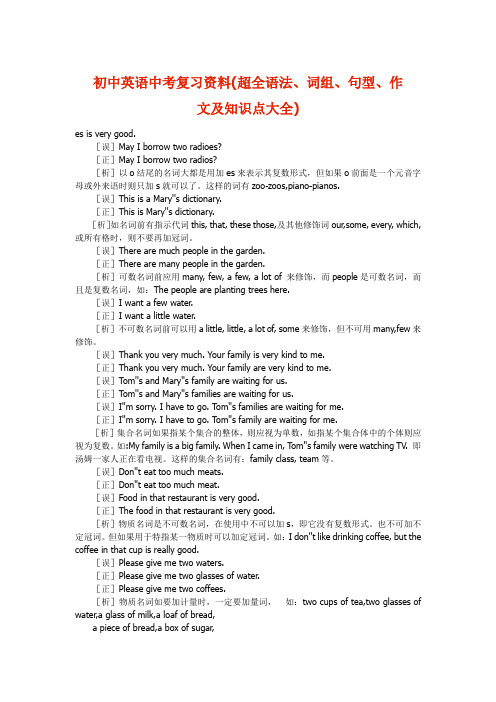
初中英语中考复习资料(超全语法、词组、句型、作文及知识点大全)es is very good.[误]May I borrow two radioes?[正]May I borrow two radios?[析]以o结尾的名词大都是用加es来表示其复数形式,但如果o前面是一个元音字母或外来语时则只加s就可以了。
这样的词有zoo-zoos,piano-pianos.[误]This is a Mary''s dictionary.[正]This is Mary''s dictionary.[析]如名词前有指示代词this, that, these those,及其他修饰词our,some, every, which, 或所有格时,则不要再加冠词。
[误]There are much people in the garden.[正]There are many people in the garden.[析]可数名词前应用many, few, a few, a lot of 来修饰,而people是可数名词,而且是复数名词,如:The people are planting trees here.[误]I want a few water.[正]I want a little water.[析]不可数名词前可以用a little, little, a lot of, some来修饰,但不可用many,few来修饰。
[误]Thank you very much. Your family is very kind to me.[正]Thank you very much. Your family are very kind to me.[误]Tom''s and Mary''s family are waiting for us.[正]Tom''s and Mary''s families are waiting for us.[误]I''m sorry. I have to go. Tom''s families are waiting for me.[正]I''m sorry. I have to go. Tom''s family are waiting for me.[析]集合名词如果指某个集合的整体,则应视为单数,如指某个集合体中的个体则应视为复数。
2023年中考英语总复习英语精华知识点全汇总建议收藏
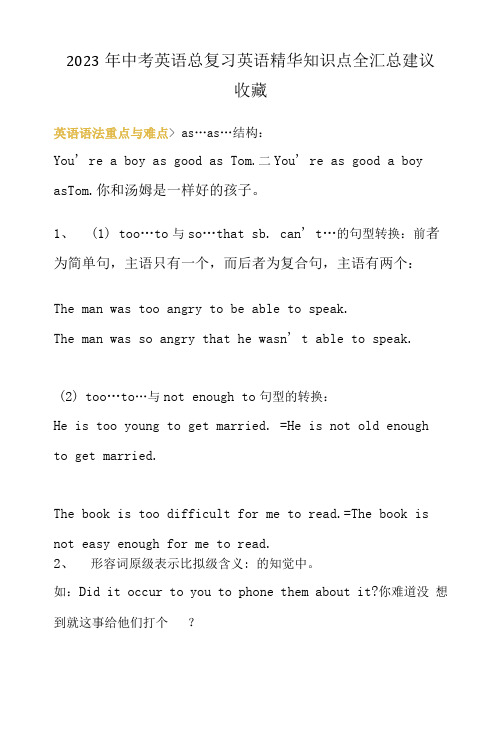
2023年中考英语总复习英语精华知识点全汇总建议收藏英语语法重点与难点> as…as…结构:You' re a boy as good as Tom.二You' re as good a boy asTom.你和汤姆是一样好的孩子。
1、(1) too…to与so…that sb. can' t…的句型转换:前者为简单句,主语只有一个,而后者为复合句,主语有两个:The man was too angry to be able to speak.The man was so angry that he wasn' t able to speak.(2)too…to…与not enough to句型的转换:He is too young to get married. =He is not old enough to get married.The book is too difficult for me to read.=The book isnot easy enough for me to read.2、形容词原级表示比拟级含义: 的知觉中。
如:Did it occur to you to phone them about it?你难道没想到就这事给他们打个?事件作主语时,happen和occur可以通用?如:The accident happened/occurred yesterday. 事故是昨天发生的。
take place指事件发生,但常用来表示“举行”的意思,带有非偶然性?如:The meeting took place last night.会议昨晚举行。
14.in front of, in the front of in front of的意思是“在前面”。
如:There is a tree in front of the house.房子前面有一棵树。
九年级英语中考冲刺短语及句型总结(全)

九年级英语中考冲刺短语及句型总结(全)九年级英语中考冲刺短语及句型总结(全)一、知识点1.Check in : 在旅馆的登记入住。
Check out: 在旅馆结账离开。
2.By: ①通过…..方式(途径)。
例:I learn English by listening to tapes.②在…..旁边。
例:by the window/the door③乘坐交通工具例:by bus/car④在……之前,到……为止。
例:by October在10月前⑤被例:English is spoken by many people.3.how与what的区别:how通常对方式或程度提问,意思有:怎么样如何,通常用来做状语、表语。
what通常对动作的发出者或接受者提问,意思为什么,通常做宾语,主语。
①How is your summer holiday? It’s OK.(how表示程度做表语)②How did you travel around the world? I travel by air.③What do you learn at school? I learn English, math and many other subjects.① What…think of…? How…like…?② What…do with…? How…deal with…?③ What…like about…? How…like…?④ What’s the weather like today? How’s the weather today?⑤ What to do? How to do it?e.g. What do you think of this book?=How do you like this book?I don’t know what I should do with the matter.=I don’t know how I should deal with it.What do you like about China?=How do you like China?I don’t know what to do next step?=I don’t know how to do it next step?㊣ What good / bad weather it is today!(weather为不可数名词,其前不能加 a )㊣ What a fine / bad day it is today! (day为可数名词,其前要加 a )4. aloud, loud与loudly的用法: 三个词都与"大声"或"响亮"有关。
中考英语丨重点句型归纳
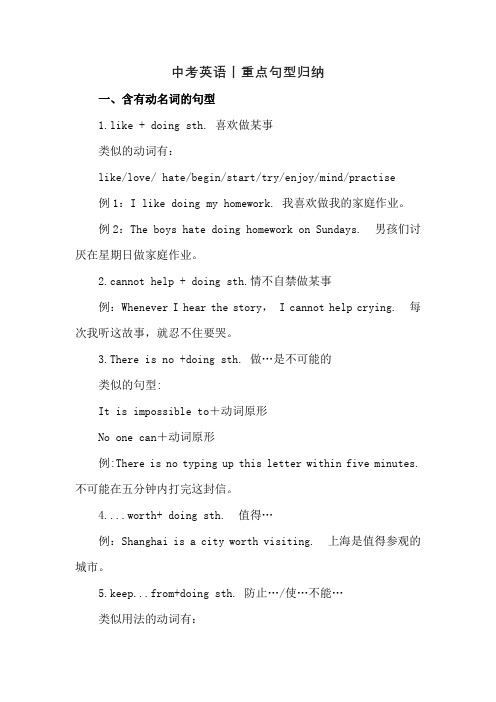
中考英语丨重点句型归纳一、含有动名词的句型1.like + doing sth. 喜欢做某事类似的动词有:like/love/ hate/begin/start/try/enjoy/mind/practise例1:I like doing my homework. 我喜欢做我的家庭作业。
例2:The boys hate doing homework on Sundays. 男孩们讨厌在星期日做家庭作业。
2.cannot help + doing sth.情不自禁做某事例:Whenever I hear the story, I cannot help crying. 每次我听这故事,就忍不住要哭。
3.There is no +doing sth. 做…是不可能的类似的句型:It is impossible to+动词原形No one can+动词原形例:There is no typing up this letter within five minutes. 不可能在五分钟内打完这封信。
4....worth+ doing sth. 值得…例:Shanghai is a city worth visiting. 上海是值得参观的城市。
5.keep...from+doing sth. 防止…/使…不能…类似用法的动词有:keep/prevent/stop/discourage+sb+from+动名词有时把 from 省略。
例1:The rain kept us from getting there on time.那场雨使我们不能准时到达那里。
例2:Nobody can prevent him from running the risk. 没有人能够阻止他去冒险。
6.I remember + doing sth. 记得曾做…remember+动名词:是指现在记得以前曾经做过某事remember+to do:记住要做某事,(还没做)。
中考英语必备句型汇总(初三英语经典句型)
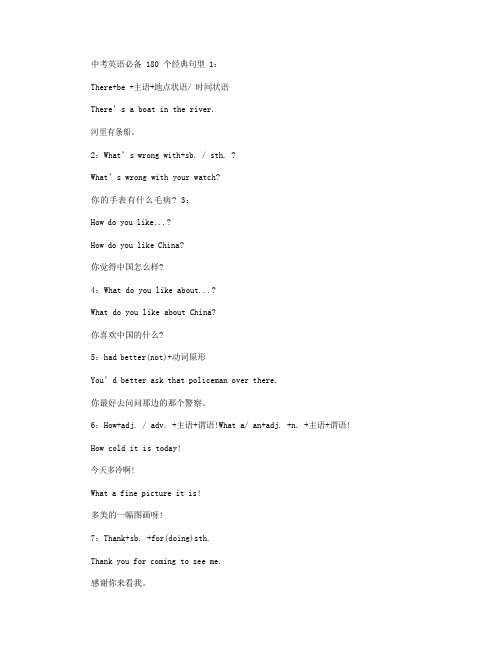
中考英语必备 180 个经典句型 1:There+be +主语+地点状语/ 时间状语There’s a boat in the river.河里有条船。
2:What’s wrong with+sb. / sth. ?What’s wrong with your watch?你的手表有什么毛病? 3:How do you like...?How do you like China?你觉得中国怎么样?4:What do you like about...?What do you like about China?你喜欢中国的什么?5:had better(not)+动词原形You’d better ask that policeman over there.你最好去问问那边的那个警察。
6:How+adj. / adv. +主语+谓语!What a/ an+adj. +n. +主语+谓语! How cold it is today!今天多冷啊!What a fine picture it is!多美的一幅图画呀!7:Thank+sb. +for(doing)sth.Thank you for coming to see me.感谢你来看我。
8:So+be/ 情态动词/ 助动词+主语He is a student. So am I.他是一个学生,我也是。
9:... not ... until ...He didn’t have supper until his parents came back.直到他的父母回来他才吃饭。
10:比较级+and+比较级The baby cried harder and harder.那孩子哭得越来越厉害。
11:the +比较级,the +比较级The more one has,the more one wants.越有越贪。
12:... as + adv.+as ...…not as(so) +adj. / adv. +as ...Do you think that art is as important as music?你认为艺术和音乐一样重要吗?Last Sunday the weather was not so wet as it is today.上个星期天的天气不如今天的天气潮湿。
初中英语必背160句,中考英语高频词+重点句型
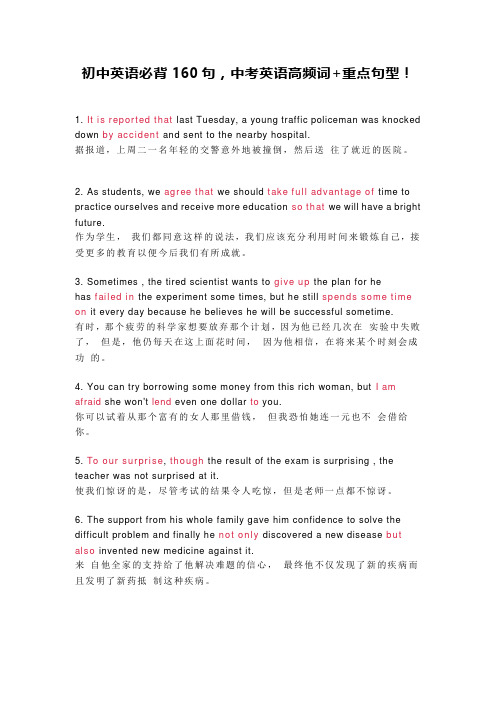
初中英语必背160句,中考英语高频词+重点句型!1. It is reported that last Tuesday, a young traffic policeman was knocked down by accident and sent to the nearby hospital.据报道,上周二一名年轻的交警意外地被撞倒,然后送往了就近的医院。
2. As students, we agree that we should take full advantage of time to practice ourselves and receive more education so that we will have a bright future.作为学生,我们都同意这样的说法,我们应该充分利用时间来锻炼自己,接受更多的教育以便今后我们有所成就。
3. Sometimes , the tired scientist wants to give up the plan for hehas failed in the experiment some times, but he still spends some time on it every day because he believes he will be successful sometime.有时,那个疲劳的科学家想要放弃那个计划,因为他已经几次在实验中失败了,但是,他仍每天在这上面花时间,因为他相信,在将来某个时刻会成功的。
4. You can try borrowing some money from this rich woman, but I am afraid she won't lend even one dollar to you.你可以试着从那个富有的女人那里借钱,但我恐怕她连一元也不会借给你。
5. To our surprise, though the result of the exam is surprising , the teacher was not surprised at it.使我们惊讶的是,尽管考试的结果令人吃惊,但是老师一点都不惊讶。
初中英语重点句型、短语(中考必背!)
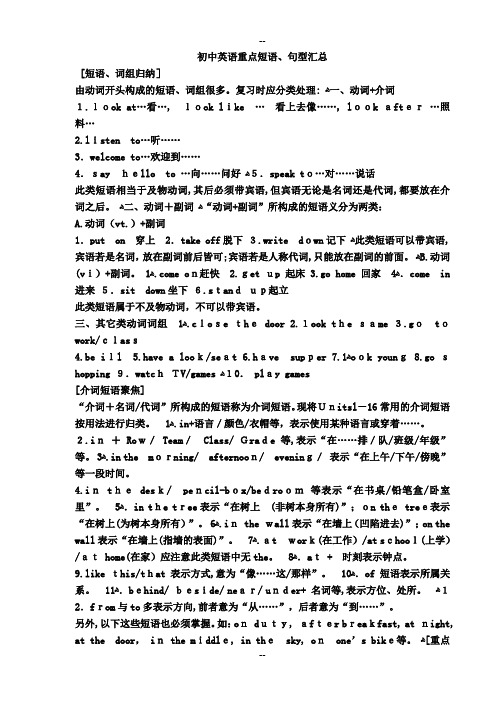
初中英语重点短语、句型汇总[短语、词组归纳]由动词开头构成的短语、词组很多。
复习时应分类处理: ﻫ一、动词+介词1.look at…看…,look like …看上去像……, look after…照料…2.listen to…听……3.welcome to…欢迎到……4.say hello to …向……问好ﻫ5.speak to…对……说话此类短语相当于及物动词,其后必须带宾语,但宾语无论是名词还是代词,都要放在介词之后。
ﻫ二、动词+副词ﻫ“动词+副词”所构成的短语义分为两类:A.动词(vt.)+副词1.put on 穿上2.take off脱下3.write down记下ﻫ此类短语可以带宾语,宾语若是名词,放在副词前后皆可;宾语若是人称代词,只能放在副词的前面。
ﻫB.动词(vi)+副词。
ﻫe on赶快 2.get up起床 3.go home回家ﻫ4.come in 进来5.sit down坐下6.standup起立此类短语属于不及物动词,不可以带宾语。
三、其它类动词词组ﻫ1.close the door 2.1ook the same 3.gotowork/class7.1ook young 8.go s4.be ill 5.have a look/seat 6.have supper ﻫhopping 9.watchTV/games ﻫ10. play games[介词短语聚焦]“介词+名词/代词”所构成的短语称为介词短语。
现将Unitsl-16常用的介词短语按用法进行归类。
ﻫ1.in+语言/颜色/衣帽等,表示使用某种语言或穿着……。
2.in+ Row/ Team/Class/ Grade等,表示“在……排/队/班级/年级”等。
ﻫ3.in the morning/ afternoon/ evening/表示“在上午/下午/傍晚”等一段时间。
4.in the desk/ pencil-box/bedroom等表示“在书桌/铅笔盒/卧室里”。
中考英语必考重要句型总结

中考英语必考重要句型总结1. It's+adj.+for sb.+to do sth. 对某人来说做某事怎么样,如:It is dangerous for children to play in the street. 孩子们在街上玩是很危险的。
2. It's time for sth. 是干某事的时间了;It's time(for sb.)to do sth.该干某事了。
如:①It's time for the meeting. 该开会了。
②It's time for us to go to school. 我们该上学了。
3. It takes sb. some time to do sth.做某事花某人一些时间。
sb. spend some time/money on sth./(in)doing sth. 某人花时间(金钱)在某事上/花时间(金钱)干某事。
sth. cost sb. some money 某事花某人一些钱。
pay some money for sth.为某事(物)付钱。
如:① It took me two hours to write the letter. 写这封信花了我两小时的时间。
② He spends half an hour(in)reading English every morning.他每天早上花半小时读英语。
③ He spends one hour on the housework every day. 他每天花一小时做家务。
④ The bike cost me 500 yuan. 这辆自行车花了我500元。
⑤ I spent 500 yuan on the bike. 我买这辆自行车花了500元。
⑥ I paid 500 yuan for the bike. 我花了500元买这辆自行车。
重要提示:cost主语一般为物;spend, pay主语一般为人。
- 1、下载文档前请自行甄别文档内容的完整性,平台不提供额外的编辑、内容补充、找答案等附加服务。
- 2、"仅部分预览"的文档,不可在线预览部分如存在完整性等问题,可反馈申请退款(可完整预览的文档不适用该条件!)。
- 3、如文档侵犯您的权益,请联系客服反馈,我们会尽快为您处理(人工客服工作时间:9:00-18:30)。
Ask sb to do要求某人做某事Ask sb not to do要求某人不要做某事Ask for要求Ask about sth问关于某事Tell sb to do告诉某人做某事Tell sb not to do告诉某人不要做某事Tell stories讲故事Tell jokes讲笑话Tell the truth说实话Help sb (to) do帮助某人做某事Help sb with sth在某事上帮助某人Want to do想要做某事Make sb do使某人做某事Let sb do让某人做某事Like doing喜欢做某事Like to do喜欢做某事Give up doing放弃做Mind doing介意做Miss doing错过做Enjoy doing喜欢做worth doing值得做Consider doing考虑做Practice doing联系做Keep doing保持做Favor doing宠爱做Fancy doing想象做Finish doing完成做Feel like doing喜欢做Have difficulty doing做...有困难Have fun doing玩的开心Have a good time doing玩的开心Hope sb do希望某人做某事Be busy doing忙于做某事Be busy with sth忙于某事Play with sth/sb与某人、某事玩Agree to do同意做某事Agree with sb同意某人Agreee to sth同意某事Decide to do决定做某事Decide on sth决定某事Be determined to do决定做某事Determine to do决定做某事Dislike to do不喜欢做某事Dislike doing不喜欢做某事Love to do喜欢做某事(从心里)Be interested in sth对某事感兴趣Discuss with sb与某人讨论Discuss about sth讨论某事Teach sb to do sth教某人做某事Give sb sth给某人某物Give sth to sb个某人某物Learn from sb/sth从某人/某事学到Listen to听Wait for sb等某人Find sb doing找到...正在做Feel sb doing感觉到...正在做Listen to ... Doing听到...正在做Hear doing听到...正在做See doing看到...正在做Watch doing看到...正在做Look at ... doing看到...正在做Feel do感觉...做Listen to sb do听到...做Hear do听到...做See do看到...做Watch do看到...做Look at ... do看到...做Stop to do停止去做Stop doing停止做Start to do开始做(主语不是人)Start doing开始做Begin to do开始做Begin doing开始做Try to do努力做Try doing尝试做Forget to do忘记做Forget doing忘记做过Remember to do记住做Remember doing记住做过Work as作为...工作Work for为...工作Work in在...工作(大地点)Work at在...工作(小地点) Be good at擅长Be good for有利于Be good with对...好Be bad at不擅长Be bad for不利于Be bad with对...不好Be friendly to对...友好Be unfriendly to对...不友好Fight with sb与某人打架Die of死于Have no right to do没有权利做There be sb/sth doing有某人/某物正在做Need to do需要做Have to do不得不做Should do应该做Do some doing最一些...Disagree to do不同意做Disagree to sth不同意某事Disagree with sb不同意某人A waste of sth浪费某物Thanks for doing谢谢做...Thanks to sb谢谢某人No doing不要做Prep + doing介词后面加doingIt is + adj + to do做......样It is + adj + for sb to do对于某人做... ...样It takes time/money for sb to do花费某人时间/金钱做It takes time/money to do花费时间/金钱做It took time/money for sb to do花费某人时间/金钱做It took time/money to do花费时间/金钱做(过去)Had better do最好做Had better not do最好不要做Help oneself请自便Help doing情不自禁做(can't)Stand doing(无法)忍受做Talk with与某人谈话Talk to对某人谈话Talk about谈论Buy sb sth给某人买东西Buy sth for sb为某人买东西Buy sth from 从...买东西Lend sth to sb借给某人某物Lend sb sth借给某人某物Borrow sb sth某人借用某物Borrow sth from sb某人借用某物Live in住在(大地点)Live at住在(小地点)Stay at呆在Arrive at到达(小地点)Arrive in到达(大地点)Put on穿上Put off脱下Keep order维持秩序Join in加入Take part in加入Be proud of为...而骄傲Set out离港Say goodbye to对...说再见Say morning to对...说早上好Look for寻找Take care of照顾Take care保重Look after照顾Pay attention注意Make up one's mind决定Drive sb + adj把某人逼到...Be mad at sb对某人生气Be mad with sth对某人生气Be determined not to do决定不要做Dream of/about梦到Complain of/about抱怨Hear from/of来信Protect from保护Differ from区别Be different from区别Believe in相信Live on靠...为生Live as作为...生活Complain to sb对某人抱怨Complain about sth抱怨某事Would rather do(A)then do(B)宁愿A 也不要BPrefer doing(A)to doing(B)宁愿A也不要B每个单元的重点句型九年级1-15单元重点句型复习Unit 31. Sixteen-year-olds should be allowed to drive.2. He doesn’t seem to have many friends. =It seems that he doesn’t have many friends. =He seems not to have many friends.3. They talk instead of doing homework.4. A: We have a lot of rules at my house.B: So do we.So +助动词/情态动词/be +主语。
So+主语+助动词/情态动词/be.5. But I’m not allowed to get my ears pierced yet.6. What’s the reason? =Why?7. I’m not allowed to go out on school nights, either.8. The other day, my friends and I talked about the rules that we have in school.9. The problem is that all my classmates think the uniforms are ugly.10. Our teachers believe that if we did that, we would concentrate more on our clothes than our studies.If +主语+过去式(be用were),主语+would +V.11. That would be a good way to keep both teachers and students happy.12. Longer vacations would give us time to do things like volunteering.13. Teenagers often think they should be allowed to practice their hobbies as much as they want.14. It’s a very difficult dream to achieve.Unit 41. He doesn’t know what to wear. =He doesn’t know what he will wear.2. I don’t know if he should bring a present.3. If I were you, I’d wear a shirt and tie.4. I’m too tired to do well. = I’m so tired that I can’t do well.He isn’t old enough to go to school. =He is too young to go to school.5. You like talking to one or two people rather than to a group. rather than=instead of6. You would also rather stay at home and read a good book than go to a party. Would rather…than…7. prefer to do… rather than do…8. You must always hide medicine from children.Unit 51. Whose guitar is this? It might belong to Alice. =be Alice’s2. What do you think “anxious” means?3. She’s worried because of her test.4. These days, strange things are happening in our neighborhood.5. There must be something visiting the homes in our neighborhood.might, would, +vmust , +be sb/sb’scan’t +/be +adj/v-ingUnit 61. I love music that I can sing along with/dance to.2. I prefer music that has great lyrics.3. I love singers, who write their own music.4. He’s made some great movies over the years.5. It does have a few good features.6. Some of her best loved photos are on display in this exhibition.7. I see the same things every day and they don’t interest me as much.8. Whatever you do, don’t miss this exhibition.9. As the name suggests, the band has lots of energy.10. I’m lucky to be here for my six-month English course.11. I’m not sure what to expect.12. But I prefer not to eat too much food that is fried.13. The main thing is to have a good balance.Unit 71. I love places where the people are really friendly.2. I like places where the weather is always warm.3. There’s not much to do there.4. –Where would you like to visit? –I’d like/love to… or I hope to…5. For your next vacation, why not consider visiting Paris?6. Traveling around Paris by taxi can cost a lot of money.7. So unless you speak French yourself, it’s best to travel with someone who can translate things for you. Unless=if…not…8. But any kind of exercise is fine.9. The room needs to be big enough for three people.10. It seems some students would like to start work as soon as possible, so they can help provide better lives for their parents.11. But many students reported that they were willing to work hard to achieve their dreams.Unit 81. Hui Ping loves to read, and she puts this love to good use by working in the after-school care center at her local elementary school.2. Not only do I feel good about helping other people, but I get to spend time doing what I love to do.3. You could help coach a football team for little kids.4. On Monday he told a radio interviewer that he had run out of money to buy old bikes.5. The strategies that he came up with worked out fine.6. For sure, you have made it possible for me to have “Lucky”.7. I cant’ use my arms or legs well.8. I feel very lucky to have him.Unit 91. I think the telephone was invented before the car.2. It was invented by Chelsea Lanmon.3. Who were they invented by?4. It gives people more time to work and play every day.5. Although tea wasn’t brought to the western world until 1610. not…until…6. Some leaves from a nearby bush fell into the water and remained there for some time.7. Basketball was invented by a Canadian doctor named James Naismith, who was born in 1861.8. Knocking into players and falling down would be dangerous.9. It’s believed that on December 21st, 1891, the first basketball game in history was played.It’s said that… It’s reported…Unit 101. What happened? What’s happening? what has happened?2. By the time she got to class, the teacher had already started teaching.3. When she got to school, she realized she had left her backpack at home.4. I’ve never been late for school, but yesterday I came very close.5. I had to wait for him to come out.6. Luckily, my friend Tony and his dad came by in his dad’s car and they gave me a ride.7. I only just made it to my class.8. Welles was so convincing that hundred of people believed the story.9. Many people ran to their local supermarket to buy as much spaghetti as they could. They could=possible10. That little joke didn’t have a very happy ending.Unit 11情态动词的不定式:1. The ground must be just right - neither too wet nor too dry. it's best to plant trees inspring because it's warmer.2. Make sure that it is straight.3. Put the tree in the hole next to the stick so that it is straight.4. Tie the tree to the top of the stick to keep it straight.5. Forests help to keep water from running away, so drought does not often happen. Lesson 42 的第一段。
